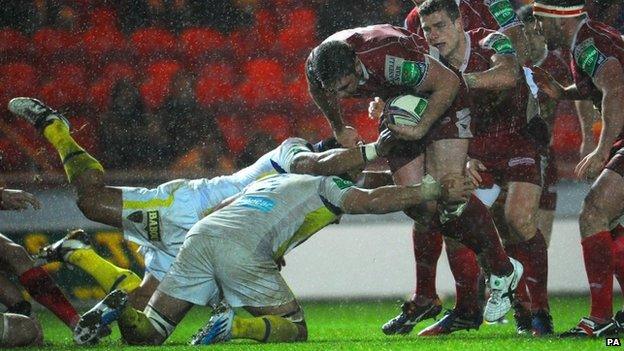Llanelli Scarlets £20m aid by council concerns raised
- Published

Scarlets lost 13-31 to Clermont Auvergne in difficult conditions on Saturday
Carmarthenshire council could have broken regulations in the way it gave more than £20m aid to Llanelli Scarlets rugby region, a funding expert claims.
The European Commission says it has not been notified of these payments.
Consultancy director Martyn Jeffries believes state aid rules are likely to apply and should have been followed.
The council said it is remained confident about independent legal advice taken in 2007 that state aid rules did not apply in this case.
However, the council has not clarified if any advice was sought after this year.
The Scarlets have been asked to comment.
State aid rules, policed by the commission, limit how much public money can be given to private companies.
In November 2008, the Scarlets' new stadium, Parc y Scarlets, opened its doors to fans for the first time.
The stadium and related facilities cost £25.4m to build and £18.3m was provided in differing forms by Carmarthenshire council.
The land is owned by the authority but the stadium and surrounding land has been leased to the club for 150 years.
The club has never had to pay rent and it will only have to pay if its income reaches a certain threshold.
Earlier this year an overspill car park close to the stadium, which was leased to the club, was sold for £850,000.
The Scarlets received around £600,000 following the sale, despite the land being owned by the council.
Significant savings
Then in October 2013, the council agreed to restructure a £2.4m loan it had given to the club.
Originally the Scarlets were paying 7% interest on that loan but the new deal sees them paying 4% interest with the potential for it to increase.
Due to be repaid by 2023, the new deal could see the council earn around £800,000 less than it would have done, had the original terms of the loan been kept.
Some local councillors have already voiced criticism of the amount of financial support the club has received, set against a background of cuts at the authority.
The council is already looking at having to make significant budget savings over the next three years.
It announced plans to transfer the ownership of parks, playgrounds and playing fields to local groups so that it would no longer have to bear the burden of cost associated with them.
'Underlying principle'
European funding expert Martyn Jeffries, a director of funding consultancy Euro28, explained that the European Commission tries to ensure the public sector does not use too much public funding to finance private companies.
There are four tests that apply to public funding and Mr Jeffries believes they all apply in this case.
He said: "So if you meet all four tests - state aid exists and therefore it has to be administered appropriately.
"There has to be an audit trail on this and the award of aid has to be notified to the commission for it to become subject to the regulations and to comply with the regulations.
"If there isn't an audit trail then they're in a position of non-compliance and the aid is therefore in breach of the regulations."
He went on to say that as state aid is the domain of the European Commission, it has "full responsibility for it" and breaches brought to its attention will be investigated.
"If a breach is found to exist then the European Commission can force the awarding body, in this case Carmarthenshire council, to recover the amount that's in breach of state aid regulations from the recipient," he said.
Legal advice
A spokesperson for the European Commission told BBC Wales: "None of these interventions have been notified under state aid rules."
In a statement, Carmarthenshire council said: "The council took independent legal advice as a requirement of its decision back in 2007.
"Such advice clarified that due to the way the original agreement was set out, state aid did not apply.
"Despite the same questions being asked and responded to repeatedly over the past six years, we remain confident with this advice, and have reiterated this on several occasions."
The council would not clarify if any advice was sought for the financial assistance given to the club after 2007.
The Scarlets financial problems have been well documented with the latest accounts showing losses of more than £1m and liabilities of over £3m.
It also casts significant doubt about the company's ability to continue as it is.
- Published4 November 2011
- Published18 October 2010